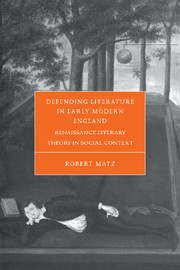Book contents
- Frontmatter
- Contents
- Acknowledgments
- 1 Introduction: “aut prodesse … aut delectare”
- 2 Recreating reading: Elyot's Boke Named the Governour
- 3 Heroic diversions: Sidney's Defence of Poetry
- 4 A “gentle discipline”: Spenser's Faerie Queene
- 5 Epilogue: from text to work?
- Notes
- Bibliography
- Index
- Cambridge Studies in Renaissance Literature and Culture
3 - Heroic diversions: Sidney's Defence of Poetry
Published online by Cambridge University Press: 13 October 2009
- Frontmatter
- Contents
- Acknowledgments
- 1 Introduction: “aut prodesse … aut delectare”
- 2 Recreating reading: Elyot's Boke Named the Governour
- 3 Heroic diversions: Sidney's Defence of Poetry
- 4 A “gentle discipline”: Spenser's Faerie Queene
- 5 Epilogue: from text to work?
- Notes
- Bibliography
- Index
- Cambridge Studies in Renaissance Literature and Culture
Summary
Renaissance man
If the life and writings of Elyot represent an early example of the sixteenth century's changing conceptions of gentility, no figure better or perhaps more famously marks these transitions than Philip Sidney. Poet, scholar, courtier, statesman and military hero, Sidney frequently exemplifies the Renaissance man, and his figure provides an image of unity in the midst of social and cultural conflict. The double title of Thomas Moffet's tribute to Sidney, Nobilis, or a View of the Life and Death of a Sidney, suggests the importance of the figure of Sidney as an exemplum, a pattern from which a contemporary could derive a coherent image of gentility. Written for Sidney's nephew William Herbert, Moffet's tribute ensures that Sidney will not die for want of an epitaph: “Truly that which gave to Sidney the title and aspect of man will not be burned by flames, washed away by streams, or consumed by worms.” But this sonnet-like praise will do more than provide a monument to Sidney's memory. Like Xenophon's poetic history, Moffet's tribute not only bestows a Sidney, but bestows a pattern to make many Sidneys. “Therefore do you embrace, cherish, and imitate” your uncle, Moffet exhorts Herbert, who will find in Sidney's life a “second self.” This self-fashioning by means of an exemplary figure repeats the model proposed in the Defence of Poetry, not just as a tribute to it, but because Nobilis sets out to do more explicitly what is implicit in Sidney's Defence: to define an exemplary, noble, self.
- Type
- Chapter
- Information
- Defending Literature in Early Modern EnglandRenaissance Literary Theory in Social Context, pp. 56 - 87Publisher: Cambridge University PressPrint publication year: 2000



